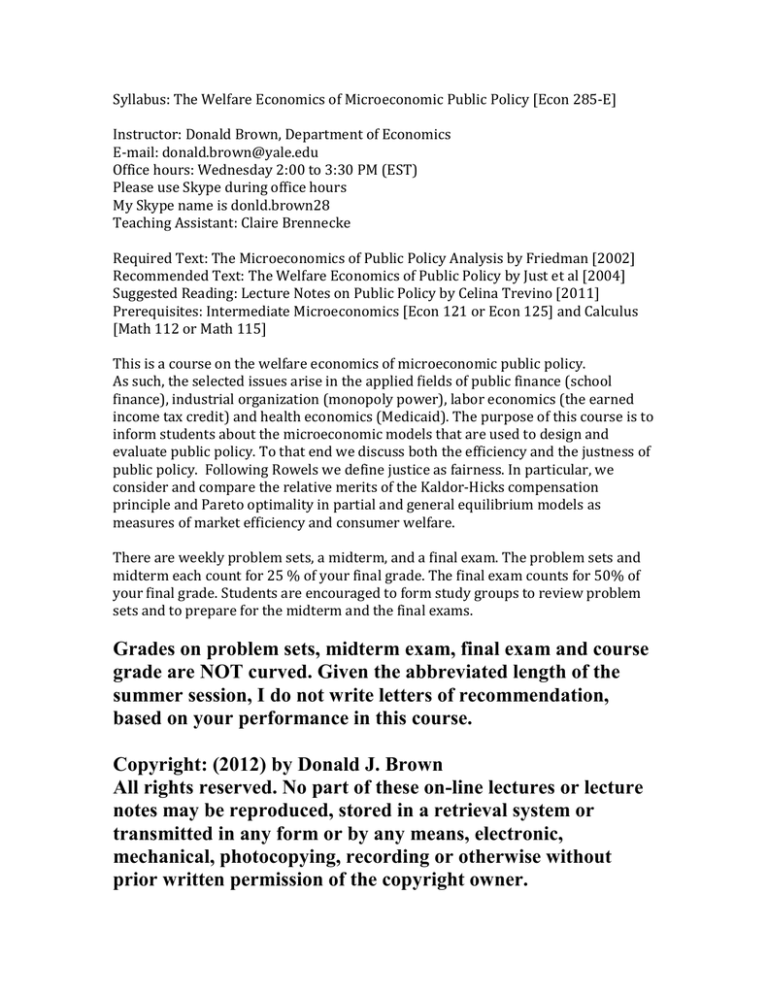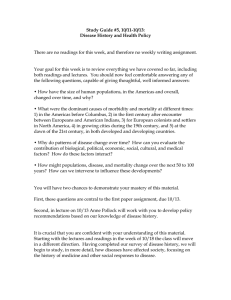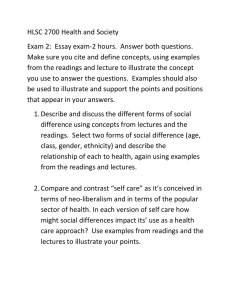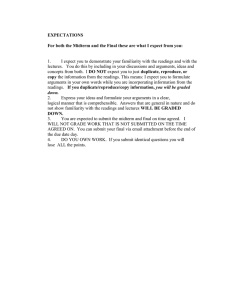
Syllabus: The Welfare Economics of Microeconomic Public Policy [Econ 285-E]
Instructor: Donald Brown, Department of Economics
E-mail: donald.brown@yale.edu
Office hours: Wednesday 2:00 to 3:30 PM (EST)
Please use Skype during office hours
My Skype name is donld.brown28
Teaching Assistant: Claire Brennecke
Required Text: The Microeconomics of Public Policy Analysis by Friedman [2002]
Recommended Text: The Welfare Economics of Public Policy by Just et al [2004]
Suggested Reading: Lecture Notes on Public Policy by Celina Trevino [2011]
Prerequisites: Intermediate Microeconomics [Econ 121 or Econ 125] and Calculus
[Math 112 or Math 115]
This is a course on the welfare economics of microeconomic public policy.
As such, the selected issues arise in the applied fields of public finance (school
finance), industrial organization (monopoly power), labor economics (the earned
income tax credit) and health economics (Medicaid). The purpose of this course is to
inform students about the microeconomic models that are used to design and
evaluate public policy. To that end we discuss both the efficiency and the justness of
public policy. Following Rowels we define justice as fairness. In particular, we
consider and compare the relative merits of the Kaldor-Hicks compensation
principle and Pareto optimality in partial and general equilibrium models as
measures of market efficiency and consumer welfare.
There are weekly problem sets, a midterm, and a final exam. The problem sets and
midterm each count for 25 % of your final grade. The final exam counts for 50% of
your final grade. Students are encouraged to form study groups to review problem
sets and to prepare for the midterm and the final exams.
Grades on problem sets, midterm exam, final exam and course
grade are NOT curved. Given the abbreviated length of the
summer session, I do not write letters of recommendation,
based on your performance in this course.
Copyright: (2012) by Donald J. Brown
All rights reserved. No part of these on-line lectures or lecture
notes may be reproduced, stored in a retrieval system or
transmitted in any form or by any means, electronic,
mechanical, photocopying, recording or otherwise without
prior written permission of the copyright owner.
Here is the reading list and schedule of lectures:
Week 1: Introduction to Microeconomic Policy Analysis
Readings: Chapter 1 in Friedman
1 Lecture
Week 1: Demand, Supply and Cost-Benefit Analysis
Readings: Chapter 2 in Friedman
2 Lectures
Week 1: Utility Maximization, Efficiency and Equity
Readings: Chapter 3 in Friedman
2 Lectures
Week 2: Analysis of Welfare Programs
Readings: Chapter 4 in Friedman
2 Lectures
Week 2: The Analysis of Equity
Readings: Chapter 5 in Friedman
2 Lectures
Week 2: The Compensation Principle
Readings: Chapter 6 in Friedman
1 Lecture
Midterm Exam: Chapters 1-5: Monday
Week 3: The Compensation Principle
Readings: Chapter 6 in Friedman
2 Lectures
Week 3: Market and Government Failures:
Readings: Chapter 13 in Friedman
2 Lectures
Week 4: Externalities
Readings: Chapter 17 in Friedman
2 Lectures
Week 4: Public Goods
Readings: Chapter 16 in Friedman
2 Lectures
Week 5: Wiliness to Pay
Readings: Chapter 6 and Appendix in Just et al.
2 Lectures
Week 5: Aggregation and Economic Welfare Analysis
Readings: Chapter 8 and Appendix in Just et al.
2 Lectures
Final Exam




